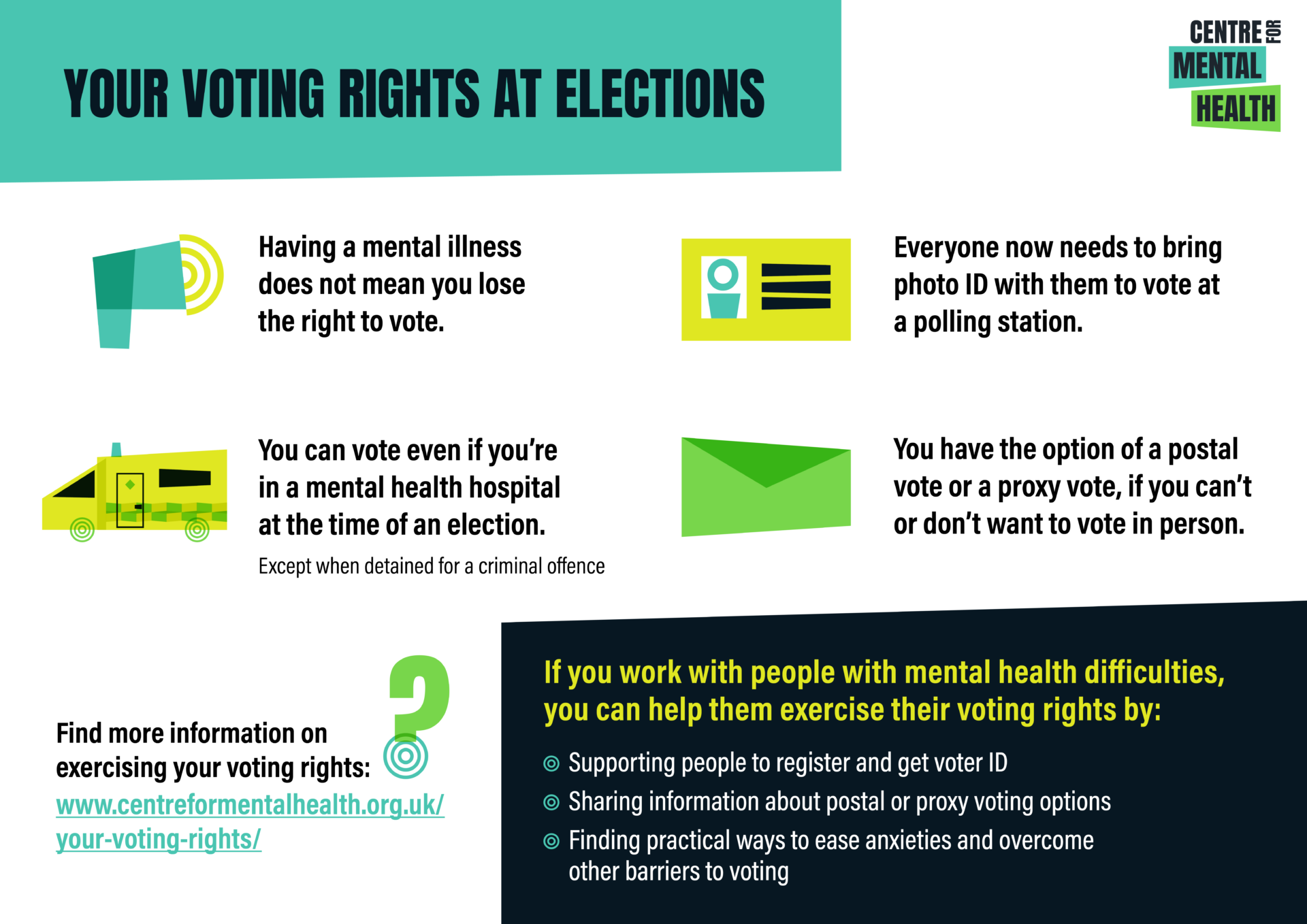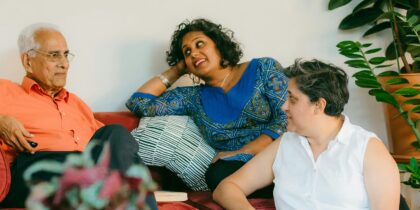Jump to information for mental health professionals, services and charities
Information for people living with a mental illness, their carers and families
Living with a mental illness doesn’t need to stop us from voting. This short guide provides practical tips and information on how to exercise your voting rights.
1. Having a mental illness does not mean you lose the right to vote
Most people over the age of 18 with a mental illness can still vote, including if you are in hospital at the time of polling day. A small number of people who are under specific sections of the Mental Health Act, or those who are in prison, are unable to vote.1
If you cannot get to a polling station on election day, there are other ways you can vote, described below.
2. You need to register to be able to vote
If you have access to the internet, you can register to vote here.
If you’re unable to register online, you can apply for a paper form from your local Electoral Registration Office. (More about this here.)
If you’re not sure if you are currently registered to vote, you can check here by entering your postcode.
3. You have the option of a postal vote or a proxy vote
If you are concerned about going to a polling station, or cannot go, for example because you are unwell or in hospital, you have the options of either a postal vote (your ballot paper is sent to your address) or a proxy vote (nominating someone to vote on your behalf at a polling station on election day).
These are both safe and secure options. Every vote, including postal and proxy votes, counts.
You can apply for a postal vote (once you are registered to vote) any time. If an election is coming up soon, make sure to check you’ve applied by the given deadline – this is usually a few weeks ahead of the election day. You’ll need to provide information including your National Insurance number, date of birth and your signature. If you don’t have this information, your council will contact you to discuss other forms of identification you can provide to prove your identity. You can apply for a postal vote here. You can also check out this easy read guide to postal voting.
You can also apply for a proxy vote. Anyone can be your proxy, but they must be registered and eligible to vote in the UK. To apply, you’ll also need to give information such as your National Insurance number, your signature, and some information about your proxy. You can apply either by post or online for a proxy vote here.
Your proxy will need to take their own photo ID to the polling station, but not yours.
4. You now need photo ID to vote at a polling station.
Going to a polling station can be an enjoyable and empowering experience, but for some people it may feel intimidating or overwhelming. You can go with a friend, carer or supporter so long as they are over 18. They can even enter the polling booth with you if you need help understanding the ballot paper. However you’ll need to mark your ballot paper on your own in the polling booth to ensure your vote is yours alone. They will be given a short form to complete.
You now need to take a form of photo ID with you to vote. There are lots of options for this, including a passport, UK driver’s licence or Blue Badge. There’s a list of accepted types of photo ID here.
If you don’t have any of the accepted forms of ID, you can apply online or by post for a free Voter Authority Certificate. You can find out more about that here.
Note: In Northern Ireland, some of the provisions described here are different, and there are some variations in Wales and Scotland.
Overcoming barriers to voting rights: information for mental health professionals, services and charities
People with mental health difficulties have lower voting rates than the wider population. We want to dismantle the barriers which can prevent people from exercising their voting rights.
Anyone working in a mental health service with people over 18 can help to ensure that their clients, patients and service users are able to vote in elections. This short guide provides practical tips and information to enable you to support people to do this.
1. People with a mental illness are as keen to register and vote as any other group in society, but face multiple barriers and hurdles.
Most people in hospital for a mental illness are still able to vote. A small number of people who are under specific sections of the Mental Health Act, or those who are in prison, are unable to vote.2 But the vast majority of people with a mental illness have the right to register and to cast their vote.
2. Simple adjustments, conversations, reassurance and support can enable people with a mental illness to be equal citizens during this election.
Some people may be concerned about what it is like at a polling station, and may require practical or emotional support to vote. Some may not feel that voting makes any difference, and that people with a mental illness are ignored by politicians. Some may have had previous negative experiences at polling stations or be worried about the new rules on photo ID. But encouraging someone to vote may enable them to enjoy an empowering experience.
3. You can help someone with a mental illness to register to vote, to get a valid photo ID to use at a polling station, or to apply for either a postal or proxy vote.
It’s helpful to emphasise that postal and proxy voting is safe and secure to anyone who is concerned that their vote might not be counted. Practical help and support to negotiate the steps people need to take to vote can make a big difference.
Here’s some useful information to share:
- If you have access to the internet, you can register to vote here.
- You can apply for a postal vote once you are registered to vote here. You’ll need to provide information including your National Insurance number, date of birth and your signature. If you don’t have a National Insurance number, or can’t find it, your council will tell you what other information they need. You can also check out this easy read guide to postal voting.
- You can also apply for a proxy vote. Anyone can be your proxy, but they must be registered to vote in the UK. To apply, you’ll also need to give your National Insurance number, date of birth, signature, and some information about your proxy. You can apply either by post or online for a proxy vote here.
- You now need to take a form of photo ID with you to vote. There are lots of options for this, including a passport, UK driver’s licence or a Blue Badge. There’s a list of accepted types of photo ID here.
- If you don’t have any of these or other accepted forms of ID, you can apply online or by post for a free-of-charge Voter Authority Certificate. You can find out more about that here.
- This also applies to a proxy voter if they are voting on your behalf. They need to take their own photo ID, not yours.
Note: In Northern Ireland, some of the provisions described here are different, and there are some variations in Wales and Scotland.
4. Be aware that many different issues can act as further barriers for some people with a mental illness to registering to vote and voting.
This may include worries about getting to the polling station, for example using public transport, or concerns that polling stations aren’t autism-friendly environments. Finding practical ways to overcome these barriers, including the use of alternatives to voting in person, or ensuring someone accompanies them to the polling station, may help to allay people’s concerns.
This webpage is based on research funded by the Electoral Commission to inform their public awareness work with under-registered groups including people with a mental illness. The information shared is the work of Centre for Mental Health, drawing on our research and the ongoing efforts of our partners to ensure that people with a mental illness are aware of and able to assert their rights as citizens through the UK’s democratic process.






